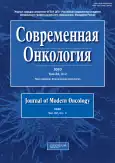Maintenance oncohematological patients and new coronavirus infection: experience of the City Clinical Hospital №52
- Authors: Baryakh E.A.1, Kochneva O.L.1, Misyurina E.N.1, Zhelnova E.I.1, Yatskov K.V.1, Zagrebneva A.I.1, Zyangirov R.R.1, Samsonova I.V.1, Poteshkina N.G.1,2, Lysenko M.A.1, Poddubnaya I.V.3
-
Affiliations:
- City Clinical Hospital №52
- Pirogov Russian National Research Medical University
- Russian Medical Academy of Continuous Professional Education
- Issue: Vol 22, No 2 (2020)
- Pages: 74-78
- Section: Original Article
- URL: https://journals.rcsi.science/1815-1434/article/view/34881
- ID: 34881
Cite item
Abstract
Justification. Oncological diseases, along with diabetes, hypertension, cardiovascular and chronic obstructive pulmonary diseases, are associated with severe course and worst prognosis of the new coronavirus infection – COVID-19. Due to the limited number of the international studies and the lack of the domestic publications on the analysis of the course of COVID-19 in patients with oncohematological pathology and the patient management tactics, this work seems extremely topical.
Materials and methods. 24.04.2020–31.05.2020, 110 patients with oncohematological pathology associated with new coronavirus infection were observed on the basis of the hematology service of City Clinical Hospital №52: 59 women and 51 men, mean age 58 (18–90) years.
Results. Currently, 24 (22%) patients among 110 are continuing treatment. The outcome of the disease is observed in 86 (78%) patients: 50 (58%) patients were discharged from hospital with complete or partial resolution of pneumonia, 36 (42%) of the 86 patients died. The groups did not differ in gender. The median age was higher in the group of deceased patients (66 vs. 54 years in patients who had a favorable outcome after COVID-19). The somatic status ECOG 3–4 was an independent predictive factor determining the adverse outcome of the disease. The third part of the patients from the group with a fatal cases due to a severe condition in the debut of the disease immediately were hospitalized in the intensive care unit (ICU), 2 (6%) of them had died within the first day. Disposition, according to the nosology showed a significant predominance among patients with an adverse outcome associated with acute leukemia (18% vs 39%). Patients with resistant course of hemoblastosis accounted for 50% of deceased patients. Severe form of the course of COVID-19 infection was twice as frequently (46% vs 84%) among patients with an adverse outcome of the disease, that was associated with both the initial more severe group of patients (33% were hospitalized in the ICU), and less curability of pneumonia against the background of the adverse prognostic factors: the older age group, the predominance of patients with acute leukemia and resistant course of oncohematological diseases. Specific anticancer therapy and COVID-19 therapy were comparable in both groups.
Conclusions. Identification of new coronavirus infection against a backdrop of oncohematological disease is associated with a severe course of COVID-19 and high death rate – 42%. According to the preliminary obtained results, the adverse prognostic factors of COVID-19 in patients with oncohematological diseases include: elderly age, the poor somatic status (ECOG 3–4), relapse or progression of hemoblastosis and nosological affiliation to acute leukemia.
Full Text
##article.viewOnOriginalSite##About the authors
Elena A. Baryakh
City Clinical Hospital №52
Author for correspondence.
Email: ebaryakh@gmail.com
ORCID iD: 0000-0001-6880-9269
Cand. Sci. (Med.)
Russian Federation, MoscowOlga L. Kochneva
City Clinical Hospital №52
Email: ebaryakh@gmail.com
ORCID iD: 0000-0001-8094-1713
hematologist
Russian Federation, MoscowElena N. Misyurina
City Clinical Hospital №52
Email: ebaryakh@gmail.com
ORCID iD: 0000-0003-2419-4850
Cand. Sci. (Med.)
Russian Federation, MoscowEvgenia I. Zhelnova
City Clinical Hospital №52
Email: ebaryakh@gmail.com
ORCID iD: 0000-0002-0343-9348
Cand. Sci. (Med.)
Russian Federation, MoscowKonstantin V. Yatskov
City Clinical Hospital №52
Email: ebaryakh@gmail.com
head of department
Russian Federation, MoscowAlena I. Zagrebneva
City Clinical Hospital №52
Email: ebaryakh@gmail.com
ORCID iD: 0000-0002-3235-1425
Cand. Sci. (Med.)
Russian Federation, MoscowRushan R. Zyangirov
City Clinical Hospital №52
Email: ebaryakh@gmail.com
rheumatologist
Russian Federation, MoscowInna V. Samsonova
City Clinical Hospital №52
Email: ebaryakh@gmail.com
ORCID iD: 0000-0002-1228-1765
Cand. Sci. (Med.)
Russian Federation, MoscowNatalia G. Poteshkina
City Clinical Hospital №52; Pirogov Russian National Research Medical University
Email: ebaryakh@gmail.com
ORCID iD: 0000-0001-9803-2139
D. Sci. (Med.), Prof.
Russian Federation, MoscowMariana A. Lysenko
City Clinical Hospital №52
Email: ebaryakh@gmail.com
ORCID iD: 0000-0001-6010-7975
D. Sci. (Med.), Prof.
Russian Federation, MoscowIrina V. Poddubnaya
Russian Medical Academy of Continuous Professional Education
Email: ivprectorat@inbox.ru
ORCID iD: 0000-0002-0995-1801
D. Sci. (Med.), Prof., Acad. RAS
Russian Federation, MoscowReferences
- Особенности ведения онкогематологических больных в условиях пандемии COVID-19. Под ред. И.В. Поддубной. М.: Экон-Информ, 2020. [Features of management of oncohematological patients in the context of the COVID-19 pandemic. Ed. I.V. Poddubnaia. Moscow: Econ-Inform, 2020 (in Russian).]
- Временные методические рекомендации. Профилактика, диагностика и лечение новой коронавирусной инфекции (COVID-19). Минздрав России. Версия 5 (08.04.2020). [Vremennye metodicheskie rekomendatsii. Profilaktika, diagnostika i lechenie novoi koronavirusnoi infektsii (COVID-19). Minzdrav Rossii. Versiia 5 (08.04.2020) (in Russian).]
- Временные методические рекомендации. Профилактика, диагностика и лечение новой коронавирусной инфекции (COVID-19). Минздрав России. Версия 6 (28.04.2020). [Vremennye metodicheskie rekomendatsii. Profilaktika, diagnostika i lechenie novoi koronavirusnoi infektsii (COVID-19). Minzdrav Rossii. Versiia 6 (28.04.2020) (in Russian).]
- Временные методические рекомендации. Профилактика, диагностика и лечение новой коронавирусной инфекции (COVID-19). Минздрав России. Версия 7 (03.06.2020). [Vremennye metodicheskie rekomendatsii. Profilaktika, diagnostika i lechenie novoi koronavirusnoi infektsii (COVID-19). Minzdrav Rossii. Versiia 7 (03.06.2020) (in Russian).]
- Mehra MR, Desai SS, Ruschitzka F, Patel AN. Hydroxychloroquine or chloroquine with or without a macrolide for treatment of COVID-19: a multinational registry analysis. www.thelancet.com. 2020. https://doi.org/10.1016/ S0140-6736(20)31180-6
- Cao B, Wang Y, Danning Wen D et al. A Trial of Lopinavir–Ritonavir in Adults Hospitalized with Severe Covid-19. N Engl J Med 2020; 382: 1787–99.
- Kuderer NM, Choueiri TK, Shah DP et al Clinical impact of COVID-19 on patients with cancer (CCC19): a cohort study. Lancet 2020; S0140-6736(20)31187-9. doi: 10.1016/S0140-6736(20)31187-9
- Poortmans PM, Guarneri V, Cardoso M-J. Cancer and COVID-19: what do we really know? www.thelancet.com. 2020. https://doi.org/10.1016/ S0140-6736(20)31240-X
Supplementary files








